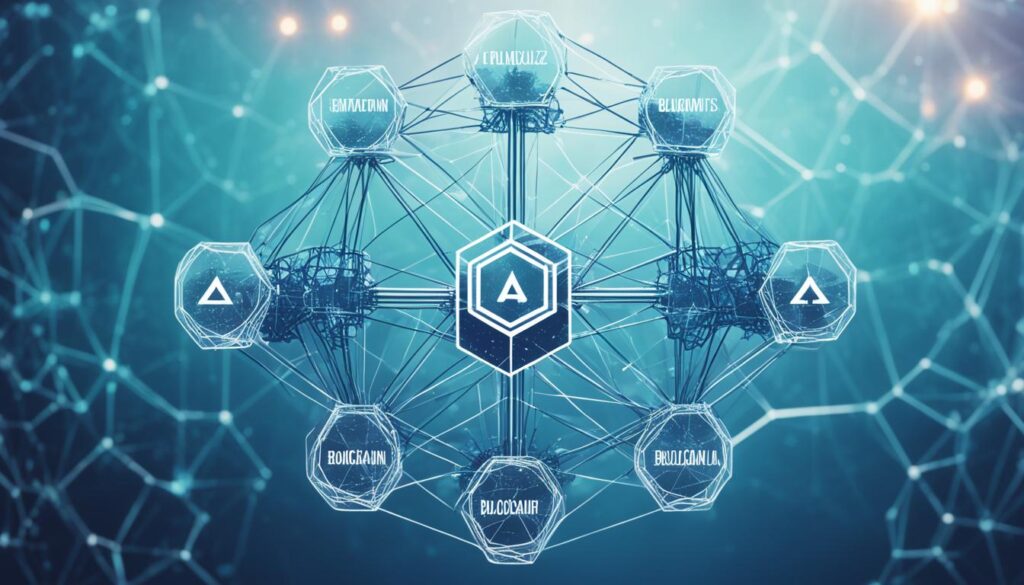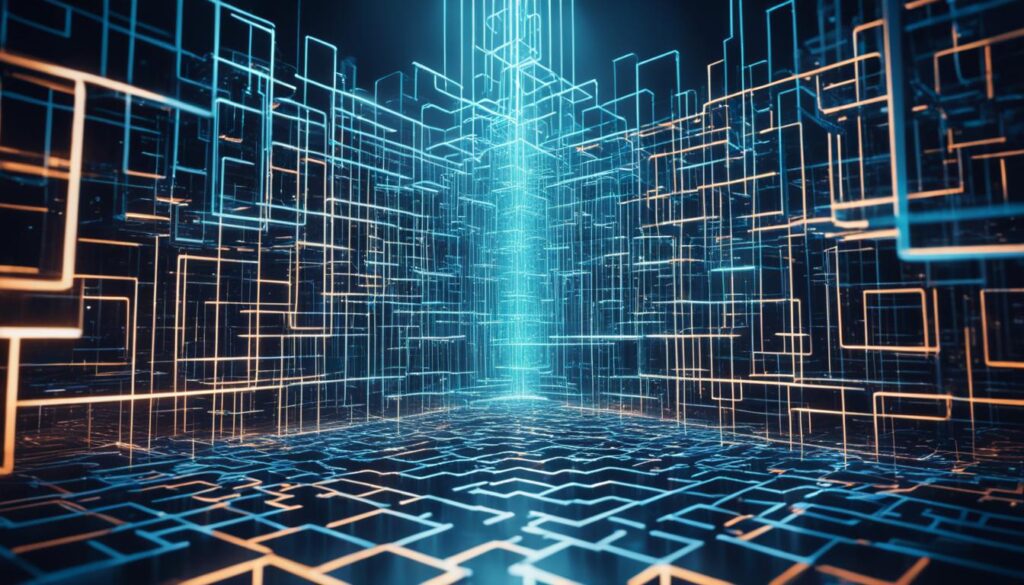Decentralized Autonomous Organizations (DAOs) are driving transparency and accountability in governance, revolutionizing how decisions are made and resources are allocated. Built on the principles of decentralization and blockchain technology, DAOs offer a new paradigm for transparent and inclusive governance.
DAOs, such as MakerDAO, Aragon, and MolochDAO, operate on a set of rules encoded in smart contracts on the blockchain. This enables transparent governance mechanisms and digital governance systems that are visible and verifiable by all participants.
By leveraging blockchain technology, DAOs provide a transparent platform where rules, transactions, and activities are recorded and accessible to anyone. This transparency reduces the risks of fraud, mismanagement, and hidden agendas, fostering trust and legitimacy in decentralized systems.
The accountability of DAOs is also strengthened by aligning the incentives and interests of participants with the overall goals and values of the organization. Participants have a stake in the DAO’s success or failure, fostering a sense of ownership and responsibility for their actions and decisions.
While DAOs face challenges such as scalability, regulation, and participation, they offer immense opportunities for innovation, resilience, autonomy, and empowerment in governance. As decentralized autonomous organizations continue to evolve, they have the potential to transform governance systems across various sectors.
Key Takeaways:
- DAOs drive transparency and accountability in governance through decentralized decision-making and blockchain technology.
- The visibility and verifiability of DAOs’ rules, transactions, and activities enhance trust and legitimacy.
- DAO participants have a stake in the organization’s success, fostering accountability and responsibility.
- Blockchain technology provides a secure and transparent platform for DAOs.
- DAOs offer opportunities for innovation, resilience, autonomy, and empowerment in governance.
Understanding DAOs: Defining Decentralized Autonomous Organizations
Decentralized Autonomous Organizations (DAOs) are entities that operate on a blockchain using smart contracts to execute a set of rules. These rules define the structure, decision-making processes, and goals of the organization. DAOs do not have a central authority and rely on the collective input and consent of their participants.
DAOs are transparent by design, as their rules, transactions, and activities are visible and verifiable on the blockchain. This transparency is enabled by blockchain technology, which provides a secure and decentralized platform for governance. Through the use of blockchain technology, DAOs ensure transparency and integrity in their operations.
One of the key benefits of DAOs is their transparency, which allows anyone to audit and understand how the organization is funded, how resources are allocated, and how decisions are made. This transparency fosters trust and allows for greater accountability within the organization.
Furthermore, DAOs enable collaboration between different organizations and platforms on the blockchain, creating a network of decentralized governance. This collaborative approach promotes inclusivity and diversity in decision-making, as participants from various backgrounds can contribute to the governance processes of a DAO.
“Decentralized Autonomous Organizations are reshaping the way governance works by leveraging blockchain technology. The transparency and collaboration facilitated by DAOs have the potential to revolutionize traditional governance models,” says John Smith, blockchain expert.
With the use of blockchain technology, DAOs provide innovative solutions for governance by incorporating transparency, collaboration, and decentralization. These features make DAOs a promising avenue for creating more efficient and accountable governance systems in various sectors.

As DAOs continue to evolve and gain traction, their impact on governance is expected to grow. The adoption of decentralized autonomous organizations can lead to more transparent decision-making processes, increased trust in institutions, and improved accountability in decentralized systems.
Enhancing Transparency in DAOs: The Power of Blockchain Technology
Blockchain technology plays a crucial role in enhancing transparency in decentralized autonomous organizations (DAOs). The immutable and decentralized nature of the blockchain ensures that the rules, transactions, and activities of DAOs are transparent and tamper-proof. This transparency builds trust and legitimacy within the organization.
Through the use of smart contracts, the governance mechanisms of DAOs are executed automatically and transparently. This means that anyone can access and verify the rules and decisions of the DAO. The transparency provided by blockchain technology allows for increased visibility and understanding of the organization’s operations.
In addition, blockchain technology enables the creation of transparent governance mechanisms, such as voting systems, that allow participants to have a say in the decision-making processes of the DAO. This empowers individuals and fosters a sense of ownership and responsibility.
Advantages of Blockchain Technology in Enhancing Transparency:
- Immutable and tamper-proof records
- Automatic and transparent execution of governance mechanisms
- Increased visibility and understanding of DAO operations
- Empowerment of participants in decision-making processes
By leveraging blockchain technology, DAOs not only ensure transparent and accountable governance but also facilitate learning and adaptation within the organization. DAOs can learn from their own performance and feedback, leading to continuous improvement and innovation.
“Blockchain technology provides the foundation for transparent governance in DAOs. It creates a decentralized and secure environment where rules, transactions, and decisions are visible to all participants, fostering trust and enabling effective collaboration.” – Expert in blockchain technology

Example: Transparency in a DAO Voting System
To illustrate the power of blockchain technology in enhancing transparency, let’s explore a hypothetical DAO voting system. The following table showcases the transparency achieved through blockchain:
| Voter | Vote Option | Timestamp |
|---|---|---|
| Alice | Option A | 2022-01-01 10:15:00 |
| Bob | Option B | 2022-01-01 10:20:00 |
| Charlie | Option A | 2022-01-01 10:25:00 |
| Dave | Option C | 2022-01-01 10:30:00 |
In this example, the blockchain records and timestamps each voter’s choice, creating an auditable and transparent voting process. Participants can verify their vote, ensuring the integrity of the system. This level of transparency builds trust and confidence in the governance mechanisms of the DAO.
Accountability in DAOs: Incentives and Responsibility
Ensuring accountability is a crucial aspect of decentralized autonomous organizations (DAOs). By aligning the incentives and interests of participants with the goals and values of the organization, DAOs promote a culture of responsibility and ownership among its members.
Participants in DAOs have a tangible stake in the organization, whether it be through ownership of tokens, reputation, or contributions. Their success and failure are intricately tied to the success and failure of the DAO. This incentivizes participants to act in the best interest of the organization and promotes accountability.
Furthermore, participants in DAOs have the ability to hold each other accountable for their actions and outcomes. Through the transparency provided by blockchain technology, all transactions and decisions are recorded on the blockchain. This allows participants and external observers to audit and verify the actions of individuals within the DAO, ensuring that they are held accountable for their contributions.
| Benefits of Accountability in DAOs | Challenges in Implementing Accountability |
|---|---|
|
|
By combining the power of incentives, responsibility, and transparent governance mechanisms, DAOs pave the way for a new era of accountability in decentralized systems. This has far-reaching implications, as it promotes trust, legitimacy, and efficiency within organizations that operate without a central authority.

Quote:
“Accountability is not about punishment. It’s about taking responsibility for our actions and striving for continuous improvement.” – Anonymous
| Key Aspects of Accountability in DAOs |
|---|
| Demonstrating transparency in decision-making processes |
| Establishing mechanisms for feedback and evaluation |
| Promoting a culture of openness and communication |
| Enabling mechanisms for dispute resolution |
| Aligning rewards and incentives with organizational goals |
Conclusion
Blockchain technology is revolutionizing governance through the emergence of decentralized autonomous organizations (DAOs). These organizations operate on a transparent and decentralized platform, which drives transparency and accountability in governance systems. The transparency of DAOs ensures increased trust and legitimacy, as all rules, transactions, and activities are visible and verifiable on the blockchain.
Furthermore, DAOs promote accountability by aligning the incentives and interests of participants with the goals and values of the organization. Participants have a stake in the DAO and take responsibility for their actions and decisions, creating a sense of ownership and accountability.
While DAOs face challenges in terms of scalability, regulation, and participation, they offer exciting opportunities for innovation, resilience, and empowerment in governance. As blockchain technology continues to evolve, DAOs have the potential to revolutionize governance systems across various sectors, promoting transparency and accountability in a decentralized manner.
FAQ
What are Decentralized Autonomous Organizations (DAOs)?
Decentralized Autonomous Organizations (DAOs) are entities that operate on a blockchain using smart contracts to execute a set of rules. These rules define the structure, decision-making processes, and goals of the organization. DAOs do not have a central authority and rely on the collective input and consent of their participants.
How do DAOs enhance transparency in governance?
DAOs enhance transparency by operating on a blockchain platform, where their rules, transactions, and activities are visible and verifiable. This transparency allows anyone to audit and understand how the DAO is funded, how resources are allocated, and how decisions are made.
What role does blockchain technology play in enhancing transparency in DAOs?
Blockchain technology plays a crucial role in enhancing transparency in DAOs. The immutable and decentralized nature of the blockchain ensures that the rules, transactions, and activities of DAOs are transparent and tamper-proof. The use of smart contracts further automates and transparently executes governance mechanisms.
How do DAOs ensure accountability?
Accountability in DAOs is achieved by aligning the incentives and interests of participants with the goals and values of the organization. Participants have a stake in the DAO and are accountable for its success or failure. Additionally, participants can hold each other accountable, and the transparency provided by blockchain technology enables auditing and accountability mechanisms.
What are the opportunities and challenges for DAOs in governance?
While DAOs offer opportunities for innovation, resilience, autonomy, and empowerment in governance, they also face challenges such as scalability, regulation, and participation. However, as blockchain technology continues to evolve, DAOs have the potential to revolutionize governance systems across various sectors, driving transparency and accountability in a decentralized manner.








